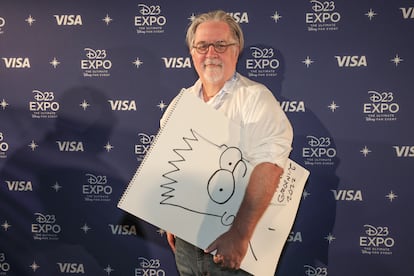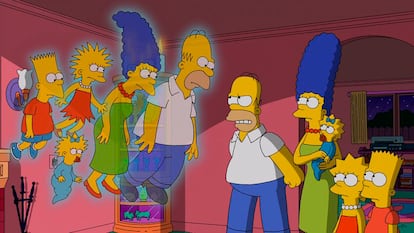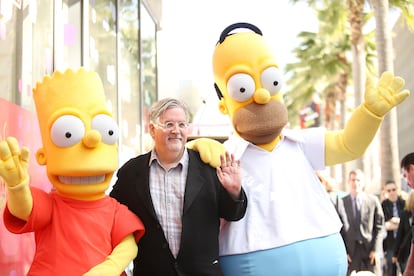Matt Groening doesn’t want to say goodbye to ‘The Simpsons’ and ‘Futurama’: ‘If you make a joke, you have to be prepared for criticism’
The 70-year-old screenwriter is launching the 12th season of the futuristic animated comedy, which has seen no changes since its beginning in 1999… except that the creators now meet via video conference


The TV series by cartoonist and screenwriter Matt Groening have made fun of several U.S. presidents, Elon Musk and the Catholic Church. His shows have also joked about obesity, child labor, stereotypes of all nationalities and — in recent seasons — the digital NFT bubble.
Groening — the 70-year-old creator of The Simpsons and Futurama, who was born in Portland — has been laughing at it all for four decades. And he has a message for those who argue that you can no longer joke about anything:
“I think the important thing is to have as much freedom as you can to express yourself, but you’ve got to be prepared for criticism. That’s justified as well. So, you put it out there and you dish it out… and you’ve got to be able to take it back,” Groening tells EL PAÍS via video call.
Contemporary humor cannot be understood without his creations. Groening is estimated to have a fortune of around $600 million dollars (at least according to the website Celebrity Net Worth), but the banalities of human beings and what happens in the world still push him to continue working. After creating The Simpsons at the end of the 1980s, he could have peacefully retired to his messy house in Malibu, which is filled with books, papers and even boxes from the extinct 20th Century Fox that peek out from the other side of the screen. He could live comfortably only with what his yellow characters generate, and the series would be repeated on a loop all over the planet (Disney + is even considering launching its own channel that broadcasts the episodes randomly).
“There’s no retirement!” he laughs. “I love my job. It’s like child’s play. Telling stories, joking and making people laugh is basically the only thing I wanted to do when I grew up. I love to continue doing it.” That’s why — in addition to keeping his place at the Springfield characters’ writing table — he’s put his efforts into fantasy series like Disenchantment and science fiction series like Futurama. He simply can’t stop telling jokes.
At the end of his interview with EL PAÍS, he’ll return to a meeting with his scriptwriters about the new episodes of Futurama, which is airing its 12th season on Disney+. “I’ll tell you what we talked about!” he exclaims, laughing. For him, these meetings have become a place to meet friends, make jokes and share anecdotes… a space to disconnect. Since the pandemic, they’ve been doing them by videoconference, which could serve as a plot for the series itself, which mixes science fiction with the surrealism of current social life.
“In Los Angeles, no one wants to drive hours to be in the same room anymore,” he explains. “I think it is one of the amazing things about Covid is that it started this whole Zoom culture.” Nothing has changed, except for the fact that they now go over everything via a small screen.
The pandemic, of course, was also predicted by The Simpsons in the fourth season episode titled Marge in Chains. This position as the oracle of Delphi has become a recurring joke on the internet, where various similarities between the show and real life are falsified or exaggerated. This month, an image of Kamala Harris in a purple suit circulated on the web next to a futuristic President Lisa in similar clothing (the character replaced Trump on the show in his fictional term). “When you do animation for decades, you’re eventually going to get something right. We try to come up with the most absurd jokes… and it turns out that the world is getting more and more absurd, so these things come true,” explains Groening, who has donated to the campaigns of defeated Democratic presidential candidates, such as John Kerry and Al Gore.
On other occasions, it simply turns out that history repeats itself, or that the episodes are very well documented, as Mike Reiss — Groening’s colleagues in scriptwriting and production — wrote in his book Springfield Confidential (2018).
Although he’s had several collaborators since day one, today, the script table is larger and more diverse. “Those of us who’ve been around for a long time, we’re older. It’s always nice to get young, fresh voices in the picture. And the new writers are fantastic. What’s great about Futurama is that our newer writers and animators have grown up on the show, so they know it in a different way. [And the team has] more diversity and more women.”
That generational gap has also given him some headaches. The documentary The Problem with Apu — released in 2017 — criticized the stereotypical role and accent of the Hindu shopkeeper in The Simpsons, one of the few Indian characters on Western television. Today, Apu is still in the series, but he hasn’t spoken for seven years. The initial voices of the rest of the Black, Latino and Asian characters were replaced by actors who actually share the same race as the animations they voice.

Groening’s series are part of the collective memory of several generations. They’re sources of happy memories, where catchphrases are thrown around between friends and family. And it’s like that all over the planet, despite the fact that the references were so typically American from the beginning. “I am so delighted by the response all over the world. We seem to do very well in Spanish-speaking countries. In Argentina, I’ve even been recognized on the street, I didn’t think that anyone would know who I was. I suppose people’s sense of humor is different, but [The Simpsons are the same] everywhere,” he reflects jovially.
Artificial intelligence
For Groening, artificial intelligence is a dystopian tool, even for Futurama: “It’s daunting and very troubling because of how quickly everything has happened. I’ve used AI just for my own amusement to construct futuristic Futurama type robots and rockets… and AI does pretty good. But it’s fake robots and has a generic air. And, so far, AI can’t really write jokes. We’re relieved about that. We think that it’s going to take actual humans to do humor. The fun thing about art and culture is the human component and the heart. Even though, we also deal with Martians and aliens and robots, it’s really about humans.”
In Futurama, his team turns all kinds of current conflicts into trying to find that human and temporal connection: “The secret of science fiction is that it’s really not about the future — it’s about right now. We just dress it up with advanced technology and the glorious contradictions and insanity of contemporary life.”
The 17th episode of the 11th season of The Simpsons shows Lisa Simpson as the first female president of the United States, dressed similarly to Kamala Harris at Joe Biden's inauguration.
— Shadow of Ezra (@ShadowofEzra) July 21, 2024
This episode, which aired in 2000, strongly suggests that real estate mogul Donald Trump… pic.twitter.com/zvFZ5RVLl8
Groening — who looks like a child in an “old man’s body” — can’t wait to recount his youthful tales of falling in love with Spain five decades ago: “It’s one of the most beautiful places I’ve ever seen. I can’t believe how gorgeous it is. I first visited Spain in 1973, when I was 19. I had a student rail pass and I went all over. I took a train from Paris to Madrid, hung out there for a while and ended up in the south, doing stupid things along the coast. It was unbelievable. I specifically remember hanging out in a really crummy little hostel in Marbella…”
The Spanish language has continued to accompany him. His wife — 47-year-old artist Agustina Picasso — is Argentine. And his children speak Spanish fluently. Groening had two children with his first wife in the 1990s (Homer and Abe), and another eight with Picasso (Nirvana, Venus, Luna, India, Sol...). His last child was born in 2022.
“Spanish is spoken probably more often than English in my household by my kids and everybody except me. I just listen to them talking about me, and they think I can understand. I believe I understand the word idiota.”
He doesn’t remember where he got Bart’s iconic “ay, caramba!” from, which the character utters in the original Spanish. “I probably saw it on television,” he shrugs. That was 35 years ago. Even though the internet has recorded all his jokes, he doesn’t bother.

Groening maintains the energy of the child he once was, who began to sketch a crazy family in his notebook. Even today, he’s surprised to see Marge and Homer — who are based on his parents — on TV.
“I am a cartoonist. I draw by hand. To be able to see the drawings that I drew for the first time, by myself, on a piece of paper at my desk… and to suddenly have them come alive and move around and speak and do their own thing… it’s so gratifying. It’s kind of like a dream.”
He underlines this after a record 760 episodes of The Simpsons (the longest-running series on American prime time), and more than 150 of Futurama, which was cancelled (and resurrected) twice. He remains hopeful that, one day, he’ll have time to make the second movie about the yellow family.
“One of the nice things about Futurama is that we were able to take a break for a while and think of new stories. Because we were off the air for about 10 years, a lot of things happened in the culture and in science fiction. The Simpsons, on the other hand, has been on the air as a TV series since 1989, and we never take a break.”
Groening hopes to live long enough to see Planet Express — the interplanetary delivery company where Philip J. Fry and his colleagues work — still up and running by the year 3024. Provided, of course, that artificial intelligence lets him keep working and — above all — telling jokes.
Sign up for our weekly newsletter to get more English-language news coverage from EL PAÍS USA Edition
Tu suscripción se está usando en otro dispositivo
¿Quieres añadir otro usuario a tu suscripción?
Si continúas leyendo en este dispositivo, no se podrá leer en el otro.
FlechaTu suscripción se está usando en otro dispositivo y solo puedes acceder a EL PAÍS desde un dispositivo a la vez.
Si quieres compartir tu cuenta, cambia tu suscripción a la modalidad Premium, así podrás añadir otro usuario. Cada uno accederá con su propia cuenta de email, lo que os permitirá personalizar vuestra experiencia en EL PAÍS.
¿Tienes una suscripción de empresa? Accede aquí para contratar más cuentas.
En el caso de no saber quién está usando tu cuenta, te recomendamos cambiar tu contraseña aquí.
Si decides continuar compartiendo tu cuenta, este mensaje se mostrará en tu dispositivo y en el de la otra persona que está usando tu cuenta de forma indefinida, afectando a tu experiencia de lectura. Puedes consultar aquí los términos y condiciones de la suscripción digital.








































